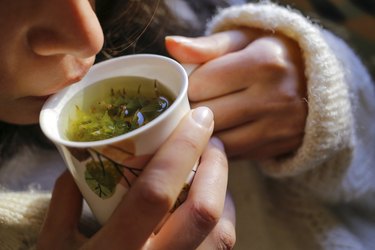
Whether you've seen it promoted by a social media influencer or at your local vitamin and supplement shop, chances are good that you've come across weight-loss tea and wondered what it is, exactly — and whether it can indeed help you shed pounds.
The short answer: Like just about any other product that promises rapid weight loss, these "skinny" teas aren't the magic bullet they're advertised to be. But that doesn't mean they're completely without benefits.
Video of the Day
Video of the Day
Learn what's in dieter's tea, how it works and what you can expect if you try it.
What Is Dieter's Tea — and What's Really in It?
Weight-loss or "detox" teas are herbal blends that promise quick fat-shedding results, along with other health benefits. However, there is little evidence that they offer any more benefits than standard green or black tea.
Typically, dieter's tea brands promise a boost in metabolism. The idea is that a faster metabolism will help you burn through more calories in less time, and therefore help you drop the number on the scale. But it's a myth that tea or caffeine alone can help you shed any fat, according to the U.S. National Library of Medicine.
Some teas, however, may cause you to temporarily shed water weight. That's because many weight-loss teas (like China Slim Tea) are formulated with an ingredient called senna, according to the National Institutes of Health (NIH), which is an over-the-counter herbal laxative found in products such as Ex-Lax and Senokot. So, while it may seem like you're losing fat, laxatives like senna only give the illusion of weight loss.
While senna is approved by the U.S. Food & Drug Administration for the treatment of occasional constipation and is generally considered safe in small doses, it may also cause stomach or bowel problems, including abdominal pain, vomiting or nausea, according to the Mayo Clinic.
Warning
Overuse or misuse of senna can also lead to liver injury, especially if you use senna in the long term (more than a week), according to the NIH.
Are There Any Benefits?
Few, if any, of the ingredients in dieter's teas are weight-loss aids. However, some of the common ingredients may have some health benefits. Chrysanthemum, for one, can provide some anti-inflammatory benefits, according to a 2015 study in Bioorganic & Medical Chemistry Letters.
Licorice root, another common detox tea ingredient, is often used as a supplement for digestive problems, according to the U.S. Department of Health and Human Services. Some even use this supplement to treat menopausal symptoms or bacterial and viral infections — however, there is limited research that has proven licorice is an effective treatment method for these conditions.
You may also find dandelion in your dieter's tea. While dandelion greens supply nutrients like fiber, magnesium and potassium, according to the United States Department of Agriculture's nutrient database, dandelion root does not offer the same benefits. However, the root may promote liver health, according to an August 2017 study in Molecules.
With all that said, you would glean the same potential health benefits from non-detox herbal teas with the same ingredients, while avoiding the risk that comes with overconsumption of senna.
- U.S. National Library of Medicine: "Can you boost your metabolism?"
- National Institutes of Health: "Senna"
- Mayo Clinic: "Senna (Oral Route)"
- Bioorganic & Medical Chemistry Letters: "Anti-inflammatory components of Chrysanthemum indicum flowers"
- U.S. Department of Health and Human Services: "Licorice Root"
- Molecules: "Purification, Preliminary Characterization and Hepatoprotective Effects of Polysaccharides from Dandelion Root"
- United States Department of Agriculture: "Dandelion greens, raw"